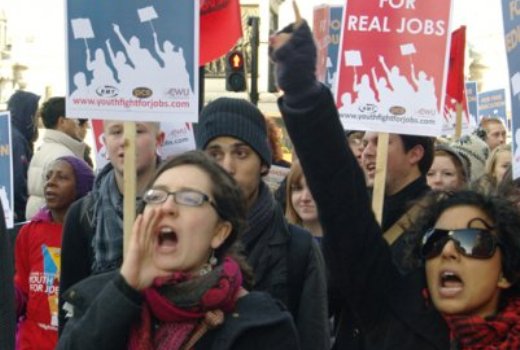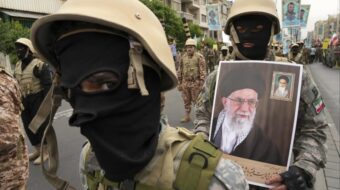
United Nations: Labor group reports bad news on young workers
The International Labor Organization issued a report August 12 indicating that at the end of 2009 81 million people between 15 and 24 years of age were unemployed, up from 11.9 percent in 2007 to 13 percent last year. The report highlights the social risk of unemployed youth, a “lost generation” who, discouraged during a time of economic crisis, have abandoned the labor market. In these circumstances, young people in underdeveloped countries are seen as particularly vulnerable to underemployment and poverty. In 2008, young workers constituted 24 percent of the world’s working poor and 18.1 percent of the world total of unemployed people. The report, accessible at www.ilo.org, shows young females experiencing more difficulties in finding work than young men.
Pakistan: U.S. base is protected at people’s expense
The Asian Human Rights Commission issued a statement August 20 condemning U.S. and Pakistani officials deemed as responsible for destroying a water bypass seven days earlier in Sindh Province. Pakistan’s Army put Sports Minister Ejaz Jakhrani, elected from the area, in charge of the operation aimed at protecting the US – operated Shahbaz airbase from flooding. Water thus diverted inundated Jacobabad district, destroying hundreds of homes, drowning the town of Dera Allahyar, and forcing the dislocation of 800,000 people. It is alleged also that the base has been closed to relief agencies. With other airfields beneath water, that prohibition has hindered medical rescue missions and food supply flights from reaching areas of need. The statement is accessible at: www.ahrchk.net/
Iran: Nuclear power plant is fueled
On August 21, after decades of delay, the Russian – built Bushehr nuclear power plant began taking on fuel. International Atomic Energy Agency inspectors were on hand, although observers agreed the $1 billion plant poses no proliferation risk, especially as return of spent plutonium-containing fuel to Russia was written into the agreement. In June, Russia backed UN sanctions against uranium enrichment by Iran. Yet Iranian spokespersons claim enrichment would be aimed at producing fuel for electricity generation thereby removing dependency on Russian fuel. The Moscow Times reported the CEO of the Rosatom Corporation, builder of the power plant, as stressing international participation in the project. Supplies were “made from more than 10 countries,” said Sergei Kirivenko.
Honduras: Land dispute pits rich versus poor
In July, soldiers harassed residents of Zacata Grande Island on behalf of Miguel Facusse. Thugs returned to the island in mid August, reinforcing demands that inhabitants leave. According to Rebelion.org, the real estate magnate, agribusiness mogul, and food manufacturer was targeting the ADEPZA cooperative, champion of land rights for families arriving on the sparsely populated island decades ago. Promising to build a school and deliver land to poor people, Facusse, whose ownership claims may be tenuous, promotes the island’s exclusive Coyolito Club. Protests erupted in April following the killing in Colon of a peasant protesting Facusse’s alleged illegal ownership of an African palm farm. Earlier he had suggested that confrontations reflect badly on “the image that Honduras projects to the world of the investors.”
South Africa: Massive strike portends future divisions
According to www.iol.co.za, it was “South Africa’s worst industrial action.” One million public sector unions affiliated with the COSATU labor federation launched an indefinite strike on August 19 when governmental offers of a seven percent wage increase and a $90 monthly housing allowance were rejected. Unions are demanding an 8.6 percent wage hike and a $130 housing allowance. Violence spread, security forces were mobilized, hospitals were barricaded, and criminal courts moved into high gear. Labor support for the Jacob Zuma presidency has plummeted. Strikers condemn government spending on World Cup facilities and on infrastructure projects, reports Al Jazeera. With government debt rising, inflation is at 4.2 percent and one million jobs have been lost since 2008, when joblessness was already 25 percent. A labor court on August 21 banned essential services workers from striking.
Cuba: American Ballet Theater will visit
“We believe in the power of the arts to connect people and transform lives,” said American Ballet Theater executive director Rachel Moore. She recently announced plans for the company to perform at Havana’s International Ballet Festival in early November at the Karl Marx Theater. Later principal dancers will be offering additional performances. This, the U.S. troupe’s first visit to the island in fifty years, comes two months after Alicia Alonso, Cuba’s famous ballerina and director of its national ballet company, was honored in New York. AFP news speculates that the U.S. government will soon expand other educational and cultural contacts between the two nations subjected to a prolonged U.S. economic blockade.
Photo: Youth Fight For Jobs demonstration in the United Kingdom. (CC)

MOST POPULAR TODAY

High Court essentially bans demonstrations, freedom of assembly in Deep South

Zionist organizations leading campaign to stop ceasefire resolutions in D.C. area

U.S. imperialism’s ‘ironclad’ support for Israel increases fascist danger at home


UN warns that Israel is still blocking humanitarian aid to Gaza






Comments